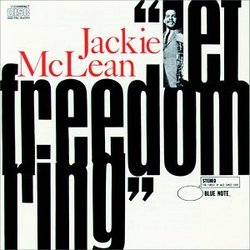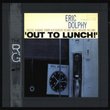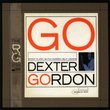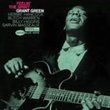| All Artists: Jackie Mclean Title: Let Freedom Ring Members Wishing: 1 Total Copies: 0 Label: Blue Note Records Release Date: 7/1/1991 Genres: Jazz, Pop Styles: Avant Garde & Free Jazz, Modern Postbebop, Bebop Number of Discs: 1 SwapaCD Credits: 1 UPC: 077774652728 |
Search - Jackie Mclean :: Let Freedom Ring
 | Jackie Mclean Let Freedom Ring Genres: Jazz, Pop
|
Larger Image |
CD DetailsSimilar CDs
|
CD ReviewsLiberating sounds from stunning saxophonist Ricard Giner (cootie@cootiesjazz.co | Brighton, UK | 06/02/2001 (5 out of 5 stars) "Let Freedom Ring might be Jackie McLean's single most important recording. "Melody For Melonae", written for his daughter, builds on urgent, intense saxohone statements that draw more on the sweeping power of Sonny Rollins' tenor than on the melodic mannerisms of Charlie Parker's alto. Not very far into his explorations, the influence of Ornette Coleman begins to make itsef felt.Arguably, Ornette Coleman may be the most pervasive influence on the album. Let Freedom Ring was recorded just a year after the remarkable series of albums for Contemporary and Atlantic that Coleman had made between 1958 and 1961. McLean explores extreme tonalities and fractured post-bop scales associated with the so-called "free jazz" that Coleman had almost self-consciously founded. The often frenzied -but never excessive- interplay between Herbie Lewis and Billy Higgins is reminiscent of the role Higgins himself and Charlie Haden played on Coleman's The Shape of Jazz to Come.But McLean's own voice is so distinctive and charismatic that it anticipates the ideas of sound that musicians such as Archie Shepp, Roscoe Mitchell and Albert Ayler would explore a few years later during the brief life of the "New Thing". There are moments when McLean stretches his notes so passionately that his cries could be mistaken for the possessed, squeaking, screeching wails of Albert Ayler.There are four tracks, including a searing rendition of Bud Powell's "I'll Keep Loving You". The others are all McLean originals. The real achievement is probably the closing piece, "Omega", which McLean dedicates to his mother. It combines a swing as vigorous as that of the previous piece, "René", with an ardent search for the essence of the theme, expressed in inflexions that subtly modulate from anger to joy, from pain to ecstasy, from hasty expectation to grateful liberation." One of the greatest jazz albums ever JEAN-MARIE JUIF | BESANCON France | 09/13/2001 (5 out of 5 stars) "March 19,1962 was a big day for Blue Note records.On this day,Jackie McLean was to record one of the greatest sessions of the label, and maybe simply of the jazz history.Walter Davis Jr plays piano,Herbie Lewis plays bass,and the immense Billy Higgins,who died a few weeks ago,shines behind his drums.Speaking of Higgins,I'd like another reviewer to explain why he uses the words of "the infamous Ornette Coleman quartet" in his review.I really would like to know what is infamous in Ornette's music;disturbing,certainly;curious,breaking all the landmarks in music, of course;unbearable for some, yes, and it took me years to listen to Ornette's Atlantic recordings,and still now, I'm not a great addict, except on some tunes.But why "infamous"???There are only four tunes in this record; a beautiful ballad written by Bud Powell ("I'll keep on loving you"),and three McLean's originals: "Omega" was written for his mother,Ms Alpha Omega McLean,"René" for his son,who plays saxophone,and the haunting "melody for Melonae",dedicated to his six-years old daughter, at the time of the recording."melody for Melonae" is a tune that will really cast a spell on you.Something unbelievable,an outstanding cry of love that will leave you breathless.Only for this tune,McLean would have reached the highest level of the musical history.His playing is as moving,as emotional as Billie's singing or Pres' playing.Really an amazing moment of music.Higgins' drumming is,of course, absolutely superlative all through the record.Maybe you'll call it "free jazz",maybe you'll call it "swing",I don't care;the 13 minutes and 20 seconds of "melody for Melonae" are just some of the most essential minutes of this music called jazz,a music of love and freedom." A transitional album Ricard Giner (cootie@cootiesjazz.co | 01/12/2002 (4 out of 5 stars) "Mr. McLean was working in a new idiom on this album, and he seems hesitant about using it. His phrases are often shorter and more repetitive than the phrases in the solos on earlier and later albums, which suggests to me he was unsure about how to continue his phrases. The solos are also marred occasionally by gratuitous sustained trills and honking. I've got nothing against key-wiggling or honking in their place, but they're out of place in the solos here, and they again leave the impression that he was sometimes at a loss about what to play next, especially as he doesn't wiggle keys or honk in the earlier and later work of his that I'm familiar with.But I've never met a Jackie McLean album I didn't like. A bad album by Jackie McLean is better than most other people's good albums. This one is certainly worth 4 stars and the [money] I paid for it, and the shipping. But if this is the first Jackie McLean album you've ever heard, you ain't heard nothing yet."
|

 Track Listings (4) - Disc #1
Track Listings (4) - Disc #1

